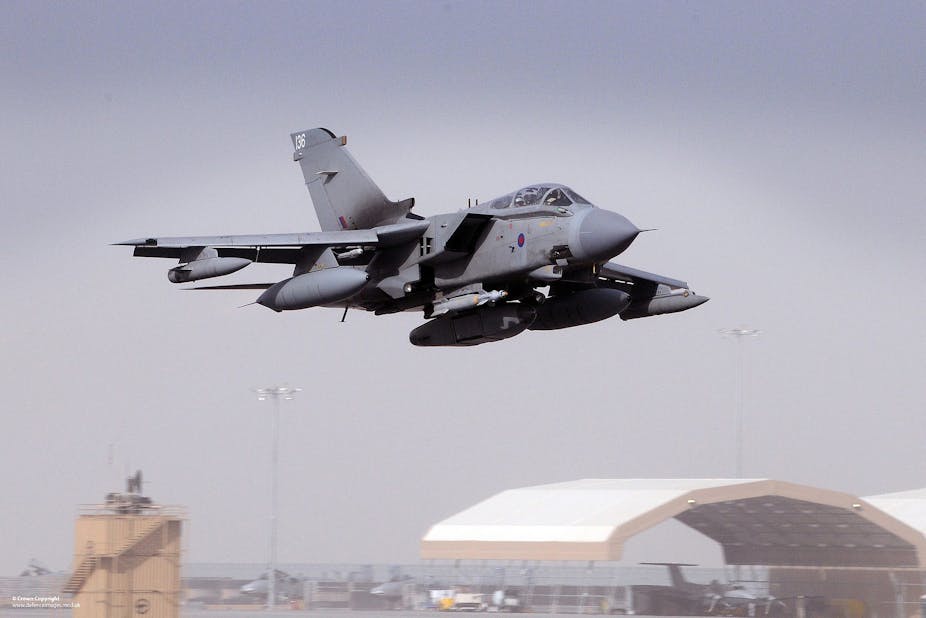As the House of Commons voted overwhelmingly to take action against Islamic State in Iraq, I was reminded of The Big Lebowski, one of my favourite films. Set in August 1990, the opening scene introduces us to The Dude (Jeff Bridges) as he buys a carton of milk with a cheque for 69 cents. Behind the cashier, George H W Bush appears on TV, famously stating that the Iraqi aggression against Kuwait “will not stand”.
Now, 24 years and two Iraq wars later, another generation of politicians has ruled that aggression in the Middle East will not stand. The UK will mount air attacks in Iraq. In some ways, a lot has changed since the time of The Big Lebowski and in others, nothing has changed at all.
Is it legal?
This time around, the Iraqi government is the ally of the UK and US rather than their enemy. In light of appeals for help from the government, the UK argues that it legally justified in its decision to mount air strikes against Islamic State in Iraq. It is justifying this claim up on the right to collective self-defence under Article 51 of the UN Charter.
The US, in contrast, has also struck targets in Syria, which has given international lawyers a headache. Some believe it contravenes international law while others question whether Barack Obama acted unconstitutionally when he authorised military strikes in Syria without congressional approval.
The UK government has decided not to stress-test arguments about its authority to use force against IS without the legitimation of Parliament. If the UK was to follow the US and launch military strikes at targets inside Syria, though, it would be opening up a similar can of worms in international law.
But Prime Minister David Cameron doesn’t appear concerned about that. He has already hinted that he sees no legal obstacle to extending the mission into Syria, arguing that it would also be justified by the doctrine of collective self-defence – IS poses a threat to Iraq, whether its fighters are to be found there or across the border. Ed Miliband, however, disagrees, stating that he would prefer a UN Security Council resolution before the UK strikes targets inside Syria. It remains to be seen who will win out.
Who is the enemy?
In 2011, the UK authorised the use of force abroad in Libya, following a UN Security Council resolution to support rebels in their fight against Colonel Gaddafi. But this time last year, parliament refused to authorise the use of force to help the disparate rebel groups fighting the Assad regime in Syria. Now, a year later, the door has been left open for intervention in Syria, not against Assad but but on one of the groups fighting against him.
The contradictions serve to highlight a significant problem – the definition of terrorism in UK law makes no distinction between a good freedom fighter and a bad terrorist. UK foreign policy, on the other hand, is clearly dependent upon this distinction. In international law, there is no agreed definition of terrorism, precisely because states disagree about whether freedom fighters are terrorists.
Legally, IS has always fitted the definition of a terrorist organisation in the eyes of UK law, but it is only in the past year that British politicians have considered them an organisation warranting a counter-terrorist – and now a military – response. Indeed, IS is being treated quite differently now than it would have been had the House of Commons vote been passed a year ago.
This dichotomy that exists between UK domestic law on the one hand and UK foreign policy on the other, muddies the water of UK counter-terrorist policy in general and creates uncertainty. This uncertainty is particularly unhelpful as the current application of counter-terrorism laws in the UK is heavily dependent upon the discretion of prosecutors and the police.
Calls to reform the current definition of terrorism to be limited to groups that pose a threat to the UK are therefore more salient than ever after today’s resolution, as are those to move towards a definition that only pertains to peace-time acts of violence rather than ones that take place in an international or non-international armed conflict.
Even before parliament approved the use of force, defence minister Michael Fallon was warning that the UK should expect a long, drawn-out campaign. And on the other side of the ocean, Obama talks of a campaign to “degrade and destroy” IS. So like the UK’s domestic counter-terrorist laws, don’t expect this new conflict against IS to be over soon. I suppose some things never change.

